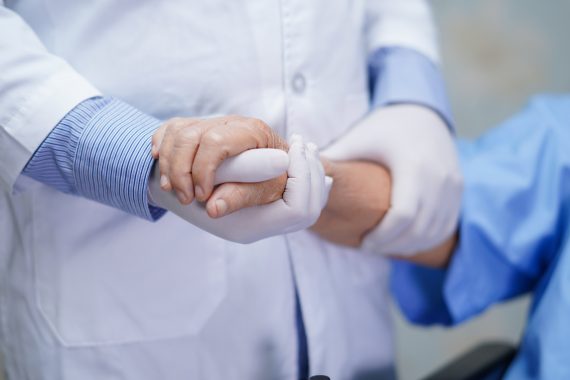The risk of hospitalisation and death are greatly reduced after one dose of the Covid-19 vaccine, according to the first comprehensive studies of the effect of the UK vaccination programme to date.
Data from Public Health England, unveiled today, found that the Pfizer/BioNTech vaccine reduced hospitalisation and death by over 75% in those who have received a dose.
Meanwhile, a study of the vaccine rollout in Scotland showed vast reductions in hospitalisations after one dose of either the Oxford/AstraZeneca or Pfizer jab.
Prime Minister Boris Johnson is unveiling the Government’s plan to ease lockdown restrictions today, backed by the promising findings.
PHE’s research into the effectiveness of the Pfizer vaccine looked at those who reported symptoms and tested positive for the virus between 8 December 2020 and 12 February 2021, alongside hospitalisation and mortality data.
The analysis revealed that one dose of the vaccine was 57% effective against catching symptomatic Covid in those aged over 80, while two doses increased protection to more than 85%.
Those aged over 80 with Covid are also 40% less likely to be hospitalised if they have had the vaccine.
PHE also analysed data on 40,000 healthcare workers aged under 65, finding that one dose of the Pfizer vaccine reduced the risk of catching the infection by more than 70%, rising to 85% after the second dose.
These levels of protection were also seen against the new variant found in South East England in December.
Dr Mary Ramsay, head of immunisation at PHE, said: ‘This is strong evidence that the Pfizer/BioNTech vaccine is stopping people from getting infected, while also protecting cases against hospitalisation and death.
‘We will see much more data over the coming weeks and months but we should be very encouraged by these initial findings.’
However, she cautioned that ‘protection is not complete, and we don’t yet know how much these vaccines will reduce the risk of you passing Covid-19 onto others’.
‘So even if you have been vaccinated, it is really important that you continue to act like you have the virus, practice good hand hygiene and stay at home.’
Health secretary Matt Hancock said: ‘This crucial report shows that vaccines are working – it is extremely encouraging to see evidence that the Pfizer vaccine offers a high degree of protection against coronavirus.
‘Vaccines save lives, and so it is vital we roll out the vaccine programme as fast as possible, and that as many people as possible take the jab.’
In a briefing, the Government’s chief scientific advisor Sir Patrick Vallance said the vaccine data was encouraging, but that the country was still ‘not in a great place yet’, and this would inform the easing of lockdown restrictions.
Sir Vallance said: ‘Vaccines are predicted to make a big difference but even with high vaccine levels and high coverage, a large number of the population remain unprotected.
‘Faster opening up is going to lead to a bigger increase in numbers, the more vaccines you can get out the better.’
He added: ’You really don’t know what effect these unlocking measures have until you do them. You will be flying blind on this unless you wait. Being driven by data is the best way to do this and to make it irreversible, as the prime minister said.’
Meanwhile, a preliminary study of the impact of the vaccination programme in Scotland to date found that by the fourth week after the first dose, risk of hospitalisation was reduced by 85% from the Pfizer vaccine and 94% from the Oxford/AstraZeneca vaccine.
Part of the Eave II project – run by the University of Edinburgh, University of Strathclyde and Public Health Scotland – the large study looked at 5.4 million people.
The paper, which is not yet peer reviewed, said: ‘UK policy for use of vaccines against Covid-19 involves an offer of a first dose followed by a second dose 12 weeks later. To our knowledge, this is the first study of Covid-19 vaccine effect against hospitalisation for an entire nation after a single dose of vaccine.
‘We provide compelling evidence that the two Covid-19 vaccines currently being used in the UK vaccination programme substantially reduce the risk of Covid-19 related hospital admissions in the population who are at highest risk for severe Covid-19 outcomes.’
Yesterday, Prime Minister Boris Johnson announced an ambition for all adults in the UK to have been offered a first dose of a Covid vaccine by the end of July.
Pulse October survey
Take our July 2025 survey to potentially win £1.000 worth of tokens













Here we go, the groundwork for canning the booster vaccination has commenced.
Sending out appointments locally now for delayed booster doses.
Delaying the booster dose has allowed many more to be protected. The BMA advice not to do so would have cost lives.
i’m 71. i’m clinically vulnerable – bronchiectasis, copd etc. and no – not smoking related. i’m waiting to go and work in our local field hospital, which is full of post covid patients and short staffed.
when i’ve had the second pfizer jab, as per the manufacturer’s protocol (rather than the government spin), i shall go back to work.
75% protection is nothing like good enough for those at high risk of death if they catch it – not when there is a readily available way to increase protection to 95%.
surely better to give second doses to the very vulnerable, rather than throw them away because of flawed government diktat ?